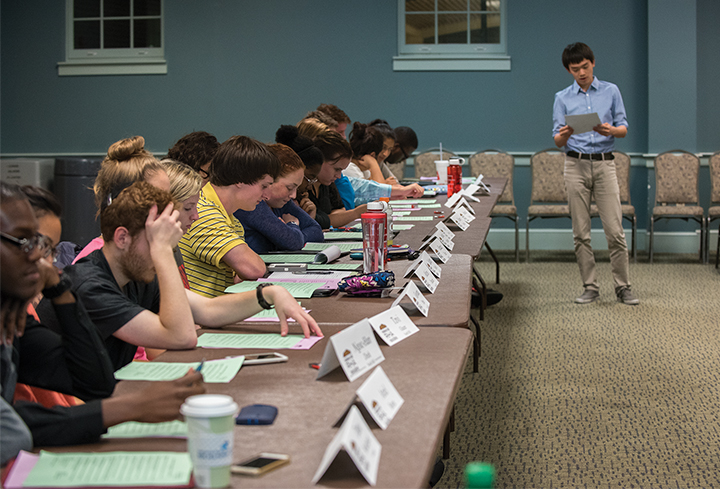The RHA Senate unanimously passed three resolutions Tuesday night in the final meeting of the current executive board’s term.
The resolutions aim to provide sustainability education during orientation, remove gendered pronouns from the Residence Hall Association constitution and bylaws, and add a tie-breaking procedure for its elections.
The first — co-authored by RHA President-elect Steve Chen and Sustainability Committee chair Dana Rodriguez — called for further implementation of sustainability education in both new student orientation and UNIV100-level classes.
Both UNIV100-level instructors and orientation advisers currently have the option to integrate sustainability lessons into their programming but are not mandated to do so, according to the resolution. The Office of Sustainability’s Student Sustainability Advisors’ programing currently only reaches about 75 percent of UNIV100-level courses, according to the office’s website.
“The orientation advisers and UNIV instructors work to develop a curriculum every single year and normally most of that stuff stays the same,” said Chen, who is also chairman of the Orientation Advisory Committee. “We’re just trying to tell them, ‘Look, we as on-campus students think that sustainability is very important so that it’s included every single year.'”
The resolution also called on the Resident Life Advisory Team and the Dining Services Advisory Board — two standing committees within the RHA Senate — to work with their respective departments to include sustainability education materials in the Orientation Virtual Folder.
Rather than handing out paper materials to each incoming student, the New Student Orientation Office hosts them all online in its Orientation Virtual Folder, where students and parents can go through more than 30 PDF files at their own pace.
“We wanted to target parents especially, because parents would be able to influence their students,” Rodriguez said. “It’s all about getting kids to start as early as they can, and then we can build, slowly, the culture of sustainability.”
The two other resolutions altered the language of both the RHA constitution and the bylaws.
Both resolutions were authored by the senate’s ad-hoc Constitutional Review Committee, a temporary committee reinstated by the senate last fall.
“We kind of started this all last year, spring semester,” said Zach Boyles, a senior government and politics major and chairman of the Constitutional Review Committee. “We didn’t get to a lot of the things we wanted to do, and we wanted to address some of the issues left over from the construction of the constitution.”
The senate first voted to change the wording of Article 8, Section 1, Clause 3 of the RHA constitution — which pertains to the “members in good standing” policy of the RHA senate — to remove the usage of “his/her.”
Boyles said the Constitution Review Committee made a point to address the usage of gender-specific pronouns in both the constitution and the bylaws, and noted that the use of “his/her” in this instance isn’t consistent with the rest of the document.
The resolution concerning the RHA Senate bylaws removed the use of gender-specific pronouns and added a section detailing a tie-breaking procedure for elections.
“We hadn’t had anything in the past for [tie-breakers], and we’ve been kind of close in elections, so it’s something we definitely needed,” Boyles said. “We decided to go with a format that was similar to regional-level decision-making procedures.”
In the event of a tie, the election will now move into a 10-minute Q&A period for each candidate. This would be followed by a caucus period, giving each resident council’s members some time to deliberate among themselves before returning for another vote.
“If a tie continues after that point, then we would continue to go with that cycle,” Boyles said. “When we’re deciding in senate, we only have a certain amount of time. We wanted to make sure there was something that the executive board could point to and go to in the event of a tie.”



